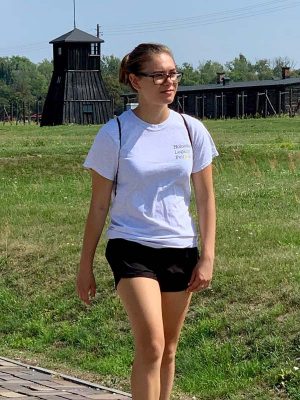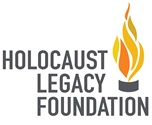Victoria Veksler
Marblehead, MA
Marblehead High School
 Telling friends and family about my experiences in Poland, not many were ready listeners. They know about the Holocaust, they have studied it in classrooms, read books, or even heard presenters talk about its importance. They didn’t need me to tell them more about it.
Telling friends and family about my experiences in Poland, not many were ready listeners. They know about the Holocaust, they have studied it in classrooms, read books, or even heard presenters talk about its importance. They didn’t need me to tell them more about it.
But what they don’t understand is that there is no possible way to know everything about it, or to even imagine the scale on which it occurred. People are quick to distance themselves from the Holocaust, to crack jokes about it, and even to spout the same anti-Semitic rhetoric that started it. While many kids complain about learning about it every year in history classes, this just serves to show that there is no possible way to comprehend it.
One of the most meaningful experiences on the trip for me was visiting the concentration camp Auschwitz-Birkenau and finding the hundreds of giant pages full of names of people who died. I had never heard anything about how the Holocaust had affected my family, which is why it had been so easy to isolate it from myself. But flipping through the pages, I found my great-grandfather, as well as nearly one thousand others who shared my last name.
At a mass gravesite, where nearly 800 children and many thousands of adults were murdered, I found myself thinking about how I would have acted in that situation. I could never have been as brave as them, but then again, they didn’t have a choice. There was nothing that they could have done that would have saved them or anyone else.
Because of Holocaust Legacy Fellows, I’ve only begun to understand. I, too, had isolated the Holocaust in my mind and didn’t understand how it affected me. But being in Germany and Poland- seeing the camps, the Jewish life, and the European’s attitudes toward and treatment of the sites, I realized that there is no way to escape it. Because of the Holocaust, 6 million members of my family were murdered, and all were persecuted. If not for the Holocaust, my life would be very different than it is today.
The Holocaust happened because people were passive, because they didn’t care enough to interfere. But the same apathy is present in our communities today as was during the time of the war. Ultimately, apathy is the reason why these issues persist and why the world never learns from its mistakes. Instead of keeping the Holocaust in classrooms, we should take it out into the open and talk about it. And thanks to Holocaust Legacy Fellows, I now have the platform to share my experiences and educate my community. I have seen how much damage a destructive mind with a powerful voice can inflict, and it is my responsibility to expose it and help ensure that this never happens again. There may not be many who remember, but those who do will never forget.
